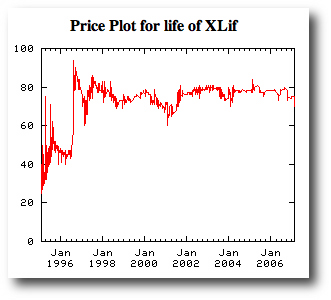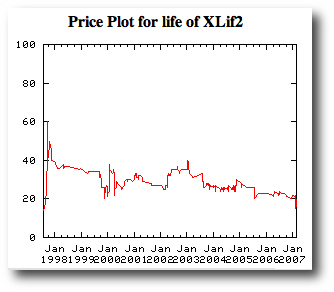
Image Source.
At first glance, the market capitalization of the Chicago Board Options Exchange, and the list of astronomers active in the field of extrasolar planets would appear to have nothing to do with one another. These two disparate entities are connected, however, by the fact that they’ve both undergone explosive growth over the past decade, and both are continuing to grow. They signify highly significant societal trends.
I think it’s safe to predict that in 25 years, the market for financial derivatives, and the level of economic activity associated with exoplanets will both be far larger than they are now. It’s interesting to ask, will there be an unanticipated co-mingling between the two? And if so, how will it occur?
One very realistic possibility is the development of an exoplanet prediction market, in which securities are issued based on particular fundamental questions involving the distribution of planets in the galaxy. Imagine, for example, that you’re an astronomer planning to devote a large chunk of your career to an all-or-nothing attempt to characterize the terrestrial planet system orbiting Alpha Centauri B. In the presence of a liquid, well-regulated exoplanet prediction market, you could literally (and figuratively) hedge your investment of effort by taking out a short position on a security that pays out on demonstration of an Earth-mass planet orbiting any of the three stars in Alpha Centauri.
Prediction markets have been adopted in a very wide range of contexts, ranging from opening weekend grosses for big-budget movies, to forecasts of printer sales, to the results of presidential elections. A highly readable overview of these markets by Justin Wolfers (who was featured last week in the New York Times) and Eric Zitzewitz of the University of Pennsylvania is available here as a .pdf file. The ideosphere site contains a wide variety of markets (trading in synthetic currency) and includes securities directly relevant big-picture questions in physics, astronomy and space exploration. Here’s the price chart for the Xlif claim,

which pays out a lump-sum of 100 currency units if the following claim is found to be true:
Evidence of Extraterrestrial Life, fossils, or remains will be found by 12/31/2050. Dead or extinct extraterrestrial Life counts, but contamination by human spacecraft doesn’t count. (Life engineered or created by humans doesn’t count.) The Life must have been at least 10,000 miles from the surface of the Earth. If Earth bacteria have somehow got to another planet and thrived, it counts, as long as the transportation wasn’t by human space activities.
It’s very interesting to compare the bullish current Xlif price quote of 72 with the far more bearish sentiment on Xlif2, which is currently trading at an all-time low of 17,

and which pays out if “extraterrestrial intelligent life is found prior to 2050”, and more specifically,
Terrestrial-origin entities (e.g. colonists, biological constructs, computational constructs) whose predecessors left earth after 1900 do not satisfy this claim. If the intelligence of the ET is not obvious, the primary judging criteria will be either a significant level of technological sophistication (e.g. radio transmitting capability) or conceptual abstraction (e.g. basic mathematical ability). Radio signals received or similar tell-tale signs of intelligence (e.g. archeological discoveries) detected and accepted by scientific consensus as originating from intelligent extraterrestrials would satisfy the claim even if not completely understood by the claim judging date.
Recently, open-source software has been released that makes it straightforward to set up a prediction market. We’ll soon have the world’s first exoplanet stock market up and running right here at oklo.org. In the meantime, feel free to submit specific claims (in the comments section for this post) that might lend themselves to securitization…

Pingback: systemic - A Habitable Earth